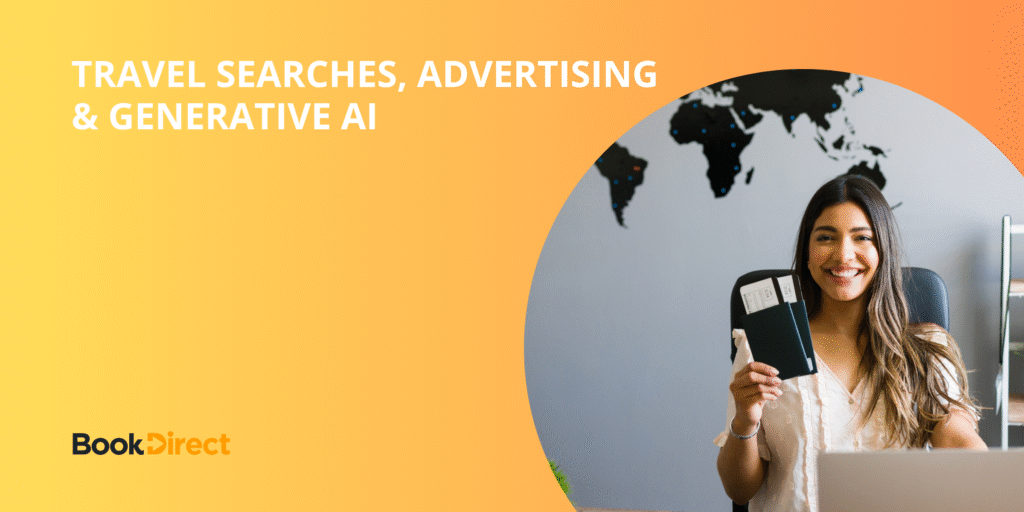
Booking travel online
Google, which must fear losing some of the touch points within a user's travel searches to generative AI, is working hard to embed AI data into its search results with the roll out of its deep AI mode this year.
Let's face it, the pace of change for booking travel online today can only be matched by the intervention of the internet at the turn of the century. Prospective hotel guests will use many touch points to complete their travel itinerary starting with search options, booking engines, payment sites and add-ons as they travel.
So, how to take advantage of this as an independent Hotel owner?
As we’ve said before, great SEO is not going out of fashion as it includes providing helpful content and a good user experience, both of which will help you benefit from those top AI overview results because it will place you in the EEAT category as an authority on whatever the potential guest was searching for.
At present, there are no ads within this Google search, generative experience but they that will be updated as the year goes on, so paid advertising will be another way to get into that AI overview.
Technology
Most hotel owners have embraced technology to increase revenue and cap costs, for example QR codes and chat Bots, but now your hotel may have to move into self-check in and check out, AI virtual agents, and virtual robotic concierge tools. You then need good business analytics streamline your operations maximising what works for your guests and removing any barriers to their travel search.
The impact of more personalisation
Google’s SERP personalisation is not a new concept, but AI driven searches will not only use the search term typed into the search box, they will deliver highly personalised search results to travellers by analysing a wide berth of data including past searches, past hotel bookings, conversations, previously listed preferences and behavioural patterns along with hobbies and other information known to them about the searcher.
Doing so will be much more likely to tailor their AI recommendations to room type, amenities, pricing, location and more likely to convert into a booking.
Google’s AI search mode & advertising
Google core revenue comes from its advertising platform and it's very difficult to get Ads seamlessly into a conversational style in the current SERP results.
YouTube has pre-roll ads, but here you are browsing rather than searching, and we all get annoyed by the ads, which is why there is a premium version of the platform.
Voice search may even have been suppressed because it would be like going back to the olden style of radio advertising where you had to listen to something before you got the information you wanted. Imagine saying, ‘hey Bixby, what's the best five-star hotel in New York City?’ And it goes, oh, well, I know you want this information, but here's 30 seconds of sponsored before you get to it, you would never use the product again to search.
The paid AI models and GPT may well stick to subscription models. But how many times have we seen Google roll out products specifically for their main product, Google ads, and it's AI powered, or algorithmically driven: the black box that you're leaving for Google to spend your money, yes Pmax campaigns, we are talking about you.
If we were to place a bet, it would be that before the end of the year, there will be a new ad type that will appear in the Google Ads platform, it may use responsive search ads and put them in a conversational style but still be charged by under the CPC or CPM model.
Partnerships
Google has been partnering with different third parties and you can see them showing up in the generative AI search section. These feel like ads placed in generative search, and could be part of the Gemini beta testing, nothing feels right at present, so it will be an interesting space to watch.
Ad structures may change from character restrained headlines and descriptions to conversational flows though, which will make them more aligned to the AI mode answers.
As Perplexity partners with Trip Advisor and SelfBook, it will show reviews and direct booking options via these platforms, which will have winners and losers. One bad review that mentions a keyword may be pulled up years later – a review from 5 years ago that mentioned bed bugs for example could kill off business in a very good hotel that has changed hands. This could go in many directions, there doesn't seem to be enough guidance or AI controls around it to know what is and what is not relevant at present, so it is a case of hang in there hotels the clouds will slowly lift and in the meantime continue will all the best digital marketing practices you are doing!
